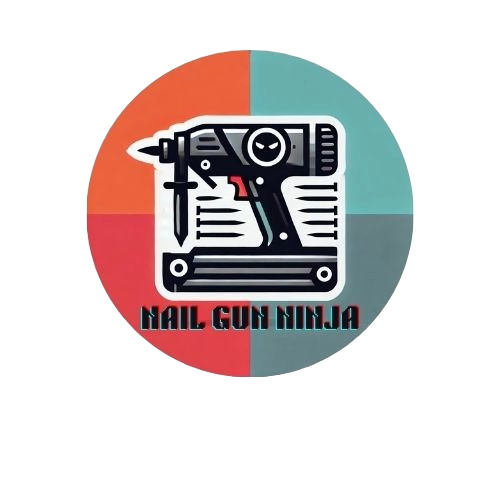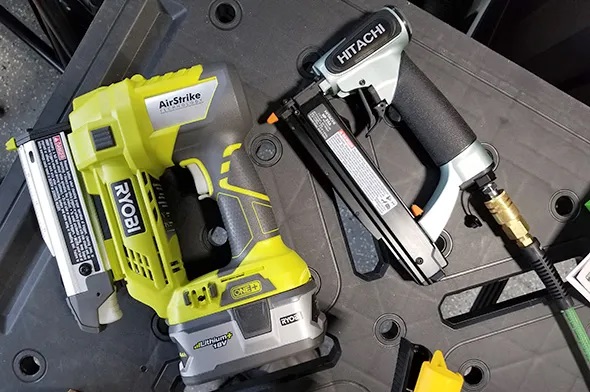Pneumatic vs battery nailer – undoubtedly a confusing selection for the roofers to framers. Nail guns are handy tools for construction workers.
However, when it is all about pneumatic vs cordless nailer it will have some subtle differences to analyze. Let’s make it simple to decide which one is best for your needs.
What’s a Pneumatic Nail Gun?
What does a pneumatic nailer mean – a pneumatic nailer is a tool that uses compressed air to fire nails into wood or other materials. These nailers are known for their accuracy and power. Their accuracy and power make them ideal for framing and roofing.
These tools are powered by compressed air, which is generated by an air compressor. This means that the power of the nail gun will depend on the size and power of the air compressor you are using.
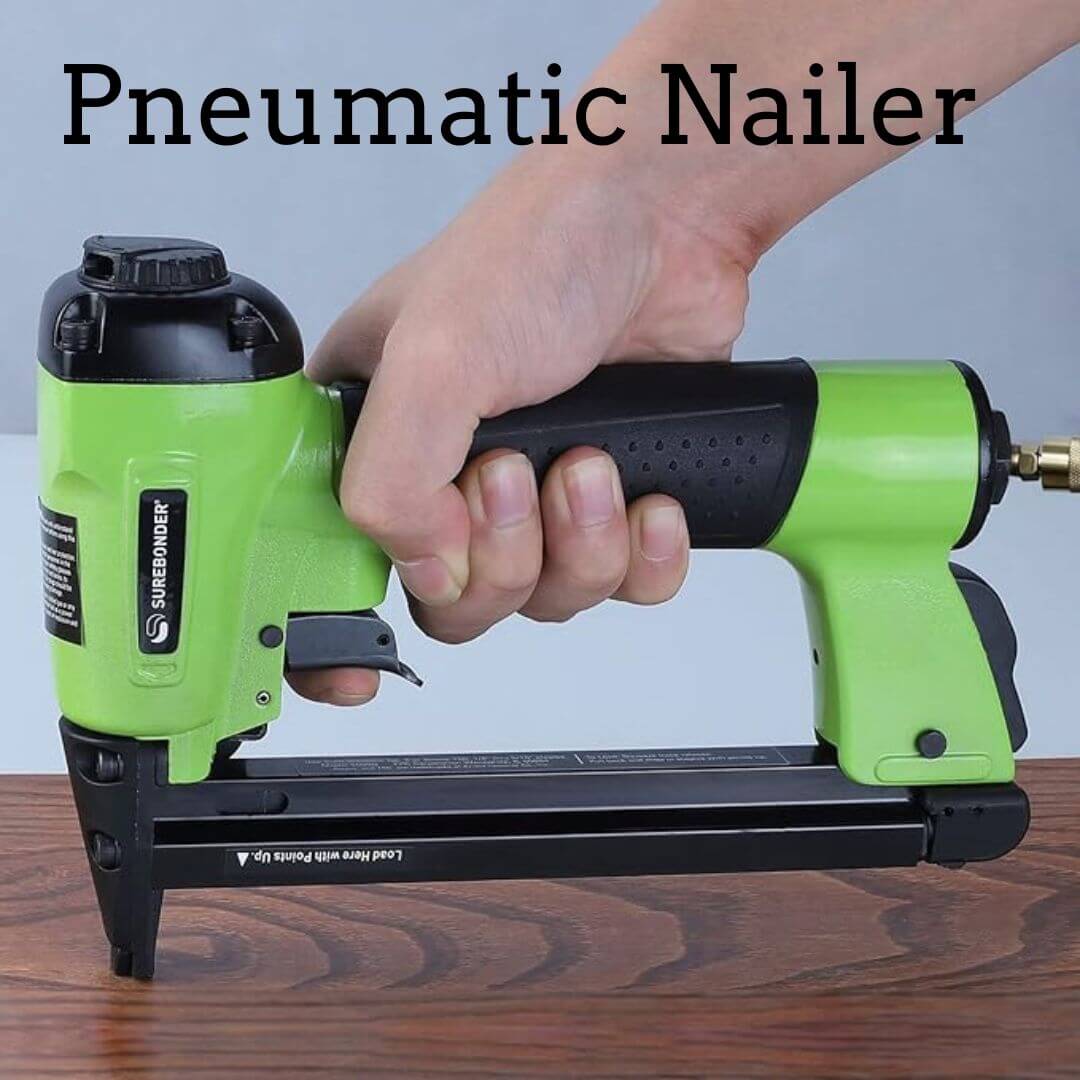
Pneumatic Nailer Pros & Cons
Every pneumatic nailer has its pros and cons. Let’s dig into it so that you can get a better vision of the tool.
Pros
Powerful
Pneumatic nailers always fire nails with a strong and great force. It makes them ideal for hardwoods like oak and pine. This also makes them the perfect choice for framing 2×4 projects or similar projects that require precision and accuracy.
Faster firing rate
If you are working on a large project, a pneumatic nailer can be very useful because it fires nails much faster than battery nailers. You can put many nails into a piece of wood quickly and accurately.
Easy to maintain
It is quite easy and simple to maintain but it is always dependent on some external equipment like air compressors or hoses. Pneumatic nail guns need regular oiling and cleaning to prevent rust and leaks.
Cost of Pneumatic Nailer
Pneumatic nailers are usually cheaper than battery nailers. This is because they don’t require batteries or other expendable parts, which means their cost is relatively low.
Ideal for heavy-duty work
A pneumatic nailer is the best choice for heavy-duty projects such as roofing. These tools fire nails with greater force and accuracy than battery nailers, making them perfect for demanding projects. For example, framing nailers and brad nailers are best with pneumatic nailers.
Cons
Compressor required
The disadvantage of using a pneumatic nailer is that you need an air compressor to power it. You will have to prepare the nailer for it to work and also ensure that the air compressor has enough pressure to power the tool.
Loud noise
Pneumatic nailers produce more noise because of the air compressor. They make noise more than battery nailers. So if you are working in a residential area, wearing protective ear gear is necessary.
Can damage the work surface
Pneumatic nailers are powerful tools and they can cause considerable damage to the work surface so, it’s important to be careful when using these tools. You can use screws instead of nails for framing if you need more holding power.
Use of Pneumatic Nailers
Large projects
Pneumatic nailers are fully appropriate for proficient and large projects like framing, roofing, or flooring that involve pouring myriads of nails swiftly and continuously.
Example: Roofing shingles, wall framing, etc.
Precision
Pneumatic nailers deliver consistent as well as powerful shots since they do not have any probability of battery drain. It is completely reliable for dense materials like hardwood or lumber framing.
Installation of flooring
Pneumatic nailers are specialized to install hardwood floorboards strongly and ensure no breaches. Consistent force ensures accurate and precise nail placement without harming the material.
Building & Construction
A pneumatic nailer is undoubtedly perfect for building construction, such as wall studs, and roof trusses, for houses or other residential structures.
Manufacturing Assembly Lines
Manufacturers or factories often use pneumatic nailers to ensure their mass production for quick setup and repetitive nailing.
Example: pallet structure, accumulating wooden crates.
Battery Nailer Pros & Cons
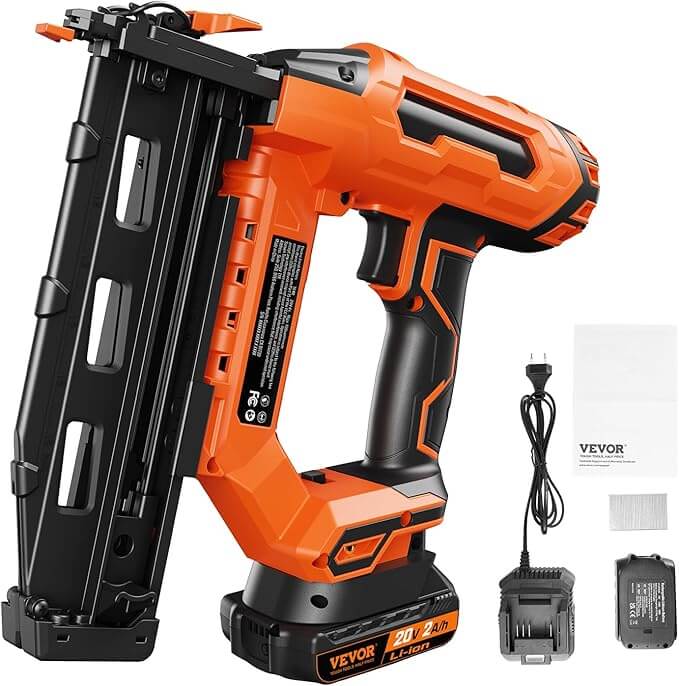
As you can guess by the name – a battery nailer is a tool that uses batteries to fire nails into wood or other materials. A battery nailer is also called a cordless nailer in the world of nail guns.
These tools are convenient and simple to use. The fact is they produce less noise than pneumatic nailers. However, there are some pros and cons to help you find the best for your needs.
Pros
Convenience
Battery nailers are convenient because they don’t require an external power source like an air compressor to operate. It means you can start working as soon as you pop in the battery inside it.
Portability
Battery nailers don’t require you to plug them into an outlet, which makes them very portable. All you have to do is charge the batteries and then you’re good to go.
Ideal for lighter projects
If you are working on light projects like trimming, a battery nailer is a perfect choice. These tools are fire nails at lower power and force than pneumatic nailers, which makes them ideal for lighter projects.
Easy to maintain
Battery nailers are very easy to use and require minimal maintenance. A battery nailer does not need regular oiling of the compressors at all. No need to worry about compressor maintenance.
Fewer chances of damaging the work surface
Since battery nailers have less power than pneumatic ones, they tend to cause less damage to the work surface. So, you can be more confident when using them for delicate projects.
Cons
Expensive
Battery nailers are usually more expensive than pneumatic nailers. This is because they require batteries or other expendable parts, which can add to the overall cost of the tool.
Not suitable for heavy-duty work
Battery nailers are not designed for heavier projects such as roofing and siding. They don’t have enough power and force to penetrate the tougher materials, so if you are working on a demanding project then a pneumatic nailer is the best choice.
Limited battery life
Battery nailers require batteries to operate, and they can run out quickly if you use them for prolonged periods. So, it’s important to keep an eye on the battery life and make sure to recharge when necessary.
Use of Battery Nailer
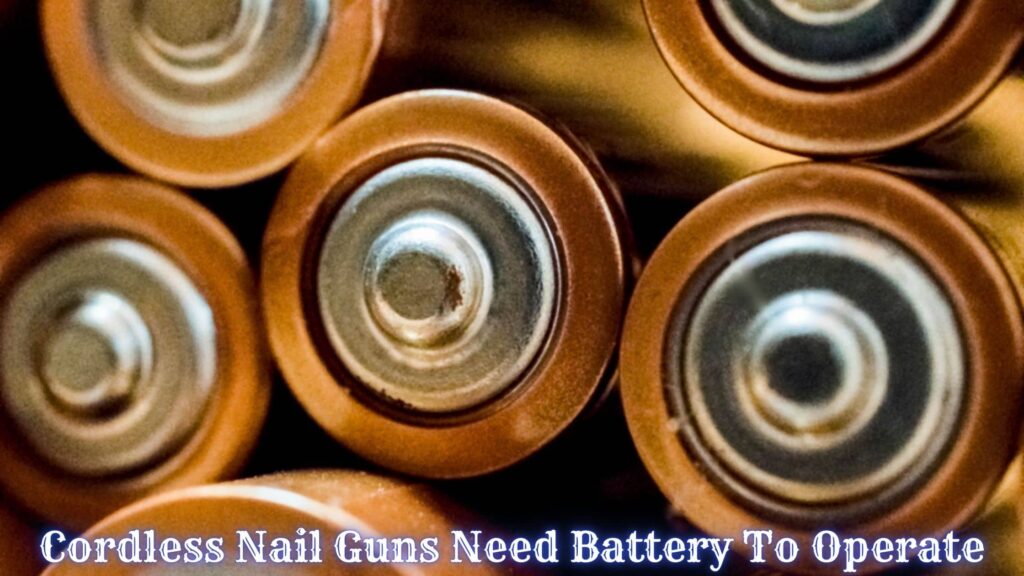
Mobility needs
Battery nailers are perfect for jobs that need moving between working sites or working in remote locations. It can be carried up in any place you want to take and have your work done.
Examples: Outdoor trim work, fence repair, garden structures
Smaller tasks
Perfect for light-duty projects such as crown molding, baseboards, and craft. It is perfect for tasks that need minimal nailing.
Trim Work
It is ideal for precise and detailed trim works like door casings, window trims, and securing loose trim.
DIY
Homeowners who keep themselves busy in making some home-oriented DIY projects will love this nailer for sure.
Examples: Hanging paneling, repairing wooden gates, and building storage shelves.
Comparing Pneumatic Nailer vs Cordless
So now that we know the pros and cons of a pneumatic nailer and a battery nailer, let’s compare them side-by-side.
Power
For this round, pneumatic nailers are the clear winner. An air compressor empowers these nailers. It gives them more power and force than battery nailers.
Price
Most pneumatic nailers are less expensive than battery nailers, as these require batteries or other expendable parts which can increase the cost.
Also, repairing any part of the tool can be more expensive for this type of nailer since it has more complex parts.
Portability
In terms of portability, battery nailers are the winners. Since they don’t require an external power source, you can take them anywhere without having to worry about plugs or cords.
Ease of use
Both pneumatic nailers and battery nailers are easy to use, but battery nailers usually require less preparation. It is very easy and quick to set up.
All you have to do is charge the batteries and you’re ready to start working. And when it comes to pneumatic nailers, you’ll have to make sure that there’s an air compressor before you start.
Weight
The weight of pneumatic nailers and battery nailers varies based on their size and type. Here, we have given you an approximate weight comparison between them.
| Nailer Type | Weight Range (In Pound.) |
| Pneumatic Nailer | 02 – 05 |
| Battery Nailer | 07 – 10 |
Pneumatic vs Cordless Nailer — At A Glance
| Differences | Pneumatic Nailer | Battery Nailer |
| Power source | Compressed air and electric power outlet | Battery powered (Chargeable) |
| Pricing | Usually cheaper | Expensive due to unique parts and battery |
| Portability | Can’t be moved too far | Can be moved anywhere since there are no wires |
| Weight | It weighs between 2 to 5 pounds | It weighs typically between 7 to 10 |
| Maintenance | Easy to use but requires regular oiling of the nail gun. | Very easy to maintain and quick to set up |
| Power | Generates more power | Generates less power |
| Firing rate | Fire faster due to more power | Fire at a slower rate |
Which One is better? Battery vs Pneumatic Nailer
So now the main question comes in – which type of nailer is better? Both types of nailers have their features, pros, and cons, so it depends on the type of project you’re working on.
If you are looking for more power and force, then a pneumatic nailer is your best choice. On the contrary, if portability and ease of use are more important to you, then a battery nailer might be the right choice.
No matter what type of nailer you choose, it’s important to make sure that it is suitable for your assigned project. That way, you can be confident that your work will be done efficiently and with quality results.
Make sure to do your research and read up on each type of nailer before making your decision.
Final Verdict on Pneumatic vs Battery Nail Gun
Choosing between an air powered nail gun and a battery nail gun depends on your work, budget, and where you will apply it.
Pick an Air-Powered Nail Gun If
- You need strong and steady power for big jobs like building houses, roofs, or fences.
- You work in a busy workshop or construction site where speed and power matter.
- You already have an air compressor.
- You want a lighter tool like air-powered nail guns that weigh less than battery ones.
Pick a Battery Nail Gun If
- You need easy movement and no air hoses holding you back.
- You work on small to medium projects like trim, baseboards, or cabinets.
- You want a quick start without setting up an air compressor.
- You can hold the extra weight from the battery and gas canister (if you use gas powered).
FAQs
Which nailer is better for beginners?
Ans: Since Battery nailers commonly do not require any air compressors or hoses they would be better for beginners.
It also does not need oiling and cleaning complexities. It is just a play-and-plug game. But once you get used to them maintaining pneumatic nailers will not be very difficult.
How long does a battery nailer last on a single charge?
Ans: A fully charged battery nailer of 18V or 20V battery can drive around 400 – 1000 nails at a stretch. But it is not a sure number.
Battery draining almost depends on the workload. Heavy workload causes fast battery draining whereas, a light workload makes it slow. So, always carrying a spare battery is highly recommended.
Are pneumatic nailers reliable?
Ans: Yes, pneumatic nailers are known for their reliability and durability. As it has no battery draining situation it can be used with extended time.
There are no worries about sudden power loss. But It has to be maintained well to ensure more reliability and durability.
What are the main drawbacks of these nailers?
Ans: Pneumatic nailers require air compressors and hoses, which limit their mobility and portability. It takes time to set up completely. It is not recommended for remote area jobs.
In terms of battery nailers, The heavy battery can cause fatigue. Users always have a headache regarding the battery draining issue.
Which nailer is safer to use?
Ans: Undoubtedly battery nailers are safer to use they are quite easy to move and they have fewer components.
Additionally, there is no high-pressure air burst during work that might happen with pneumatic nailers.
Which one to buy for occasional use?
Ans: It is sure that, a battery nailer is best if you plan to use it occasionally. It is very easy to use and simple to maintain. Keep in mind that if you use it very rarely the battery performance may drop automatically.
So, it is ok to buy it for occasional use but do not keep it locked in your store or garage for month after month.
What happens if pneumatic nailers run out of air?
Ans: The nailer may misfire and can not drive nails accurately in a positive manner. It can damage the materials. Loses the driving power. You need to regularly maintain the compressor and check the air levels.
Have a Good Nailing!!
